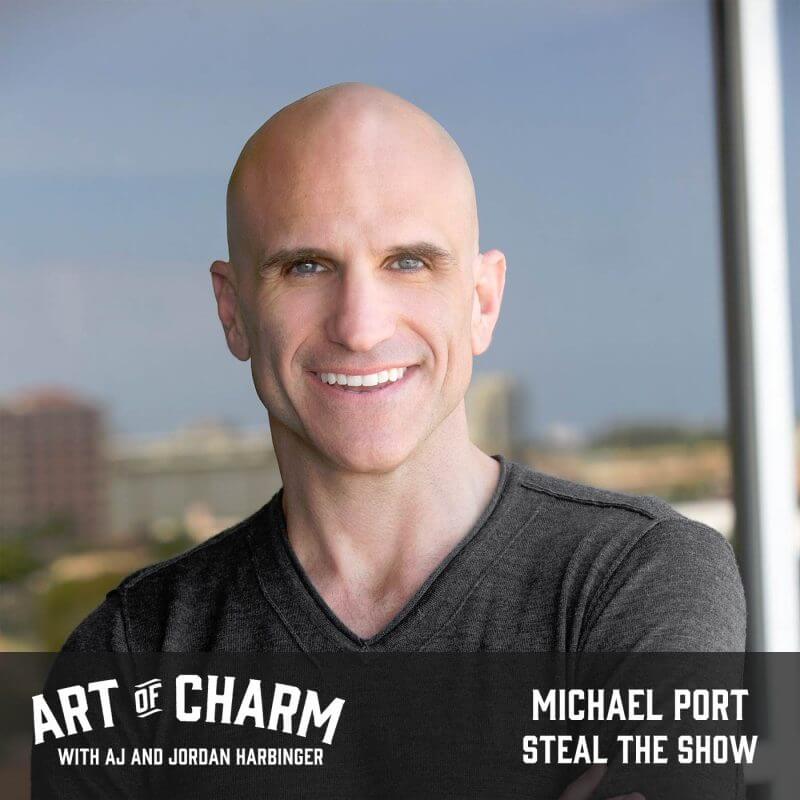Every interaction is a performance — whether you’re speaking up in a meeting, pitching a client, negotiating a raise, or walking into a job interview. Michael Port tells us how to steal the show.
“There’s a benefit to being chameleon-like.” -Michael Port
The Cheat Sheet:
- At its core, a good performance is genuine. (08:10)
- How do we separate our desire for validation from a desire to get results? (14:58)
- An authentic performance requires clear objectives (20:50)
- Avoid talking in absolutes (it invalidates your arguments). (27:30)
- Choose early, and choose often. (34:42)
- And so much more…
[aoc-subscribe]
As Shakespeare said, “All the world’s a stage, and all the men and women merely players; they have their exits and their entrances, and one man in his time plays many parts.” When you consider that we’re called upon to persuade, motivate, and inform others every time we interact by playing a role that’s an extension of ourselves, Shakespeare was pretty spot on. So if we’re playing these roles and performing in some way every day, shouldn’t we give it our all and steal the show?
In episode 450 of The Art of Charm, we talk to New York Times best-selling author Michael Port about the principles behind his new book, Steal the Show: From Speeches to Job Interviews to Deal-Closing Pitches, How to Guarantee a Standing Ovation for All the Performances in Your Life, and its companion podcast. Enjoy!
More About This Show
If you think about our everyday interactions with people as performances, shouldn’t you strive to give the best performances possible? Steal the Show author Michael Port draws on his experience as an actor and a highly sought-after speaker (who always gets a standing ovation) for training people to do just that.
But becoming good as a performer isn’t just about changing how other people view you; it helps you understand who you are and how taking on different roles doesn’t have to be inauthentic. In fact, the best performers maintain authenticity by recognizing these roles as natural extensions of themselves that react appropriately to the situation at hand.
“Great performers have a really true, deep understanding of who they are and are generally comfortable with it,” says Michael. “That allows them to step into other people’s shoes and see the world from different perspectives — see each person as an individual and really love that other people are individuals and embrace that and start to connect with people in different ways than they’re used to.”
Michael stresses that getting to be a good storyteller is a valuable skill for anyone to develop — and it goes hand-in-hand with being an effective performer — because it’s built in to every social situation. If you’re at a party, what do people share? Stories. On a date? Stories. Interviewing for a job? Stories. But for the stories to be meaningful, the audience needs to be able to relate to the storyteller. There needs to be shared empathy from a mutually understood perspective.
“In a speech, one of the most important things that an audience needs to know is that you know the way the world looks for them,” says Michael. “And you know how it could look — and it could look a lot better. So we are trying to take them on a journey to what is better. When you meet somebody, let’s say you’re networking together, it really makes a difference if they believe you understand the way the world looks to them. And in the development of that relationship, if you are helping them see the way the world could look, well then that relationship can develop very powerfully and positively over time.”
This can apply to any interaction — even on dates.
“You go on a date with somebody; if they don’t feel you understand the way the world looks to them, you’re not going to get a second date,” says Michael.
On Research, Dress Rehearsal, and Overcoming Stage Fright
The way we behave in front of one group of people may not be appropriate for another; Michael shares the example of an upcoming speech he’ll be giving to a conference of Orthodox Jews. Obviously, the material he’ll cover will be presented differently from how he might deliver it to a dockworker union or an orphanage.
Researching your audience and crafting your presentation — as well as exhaustively rehearsing it — well ahead of time will ensure that you remain mindful of understanding how the world looks to that audience.
(Incidentally, Michael advises against slides unless they’re developed after the content of the speech is written. This way, they serve as an enhancement of the speech rather than an awkward crutch for the speaker to lean on.)
“You know…the best way to overcome stage fright?” asks Michael. “Without a doubt, the best thing to do? Just be prepared. Do the work. Because when you’re prepared, you feel a lot more confident. One of the reasons I think people get so nervous about speaking in front of others and one of the reasons that people make [the assumption that most prefer death to public speaking] is because most of us don’t prepare.”
Michael goes on to say that a lot of people who possess the so-called “gift of gab” and find speaking easy settle for being average because they’ve never worried about preparing. It’s the people who don’t consider themselves natural speakers who go out of their way and, more often than not, prepare themselves into becoming amazing.
Which one will you be for your next performance?
THANKS, MICHAEL PORT!
Resources from this episode:
Steal the Show by Michael Port
Michael’s podcast: Steal the Show
Other books by Michael Port
The Art of Charm bootcamps
You’ll also like:
-The Art of Charm Toolbox
-Best of The Art of Charm Podcast
On your phone? Click here to write us a well-deserved iTunes review and help us outrank the riffraff!




